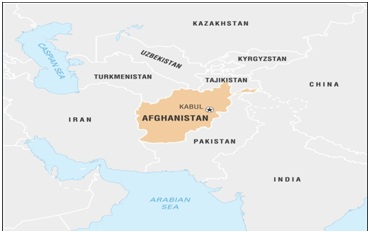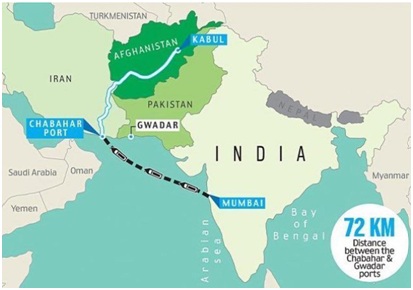

Context
After a row erupted between India and Pakistan over the modalities of transportation, Pakistan finally agreed to let India transport wheat and life-saving drugs as humanitarian assistance for the people of Afghanistan on Afghan trucks through the Wagah border crossing.
About
Afghanistan (the country profile)
- Afghanistan is a landlocked country, bordered by Pakistan in the south and east and Iran in the west.
- Afghanistan depended on Pakistan as Karachi was the only port it could access.
- Pakistan has exploited Afghanistan geographical location.

Facts about India to Afghanistan route
- Delhi to Kabul is a distance of 990 km. Delhi to Kabul via Chabahar port in Iran is 3900 km, which is more than thrice the distance.
- Pakistan has been the traditional supplier of wheat to Afghanistan.
- India to Afghanistan road route goes via India-Pakistan Wagha Border.
- Pakistan to Afghanistan road is conncted via six routes as on 2021.
- New delhi to wagha border
- wagah border to Chaman border crossing (or any other crossing).
- Chaman border crossing to Kabul
- There are six official border crossings and trade terminals between Afghanistan and Pakistan. Those are
- Angur Ada Khyber
- Badini Balochistan
- Chaman Balochistan
- Ghulam Khan Khyber
- Kharlachi Khyber
- Torkham Khyber

|
Chabahar Port
|
India’s attempt to enter into Afghanistan (post Taliban)
- India attempted to work its way back into Afghanistan by agreeing to host the third Regional Security Defense Dialogue (RSDD) in New Delhi in September 2021 — less than a month after the Taliban had taken over Kabul.
- The RSDD is an Iranian initiative which hosted the first two meetings of the forum in 2018 and 2019.
- Participants: Kazakhstan, Kyrgyzstan, Russia, Tajikistan, and Turkmenistan accepted the Indian invitation issued by its National Security Adviser, Ajit Doval. There were two significant no shows: Pakistan and China.
- The meeting in India issued what came to be known as the “Delhi Declaration”.
- It asked the Taliban-led government to ensure that its territory “would never become a safe haven for global terrorism”.
- It stressed the need for an “open and truly and inclusive government” and ensuring the “rights of women, children and minority communities”.


